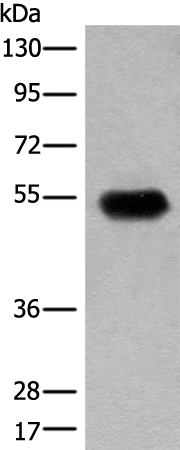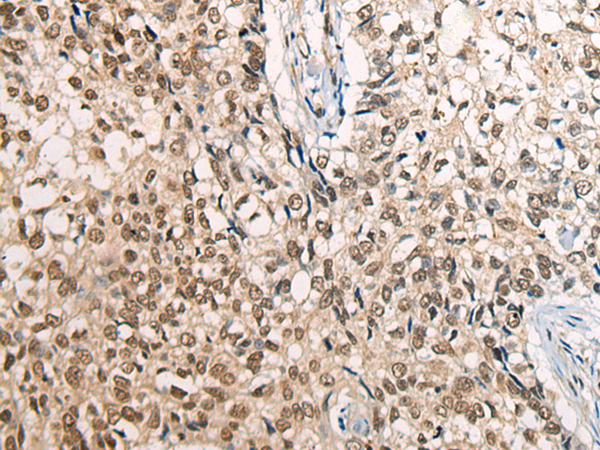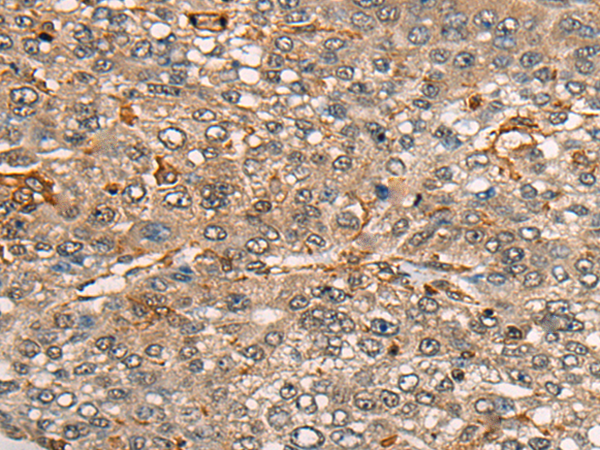


| WB | 咨询技术 | Human,Mouse,Rat |
| IF | 咨询技术 | Human,Mouse,Rat |
| IHC | 1/30-1/150 | Human,Mouse,Rat |
| ICC | 技术咨询 | Human,Mouse,Rat |
| FCM | 咨询技术 | Human,Mouse,Rat |
| Elisa | 1/5000-1/10000 | Human,Mouse,Rat |
| Aliases | DUP; RIS2 |
| WB Predicted band size | 60 kDa |
| Host/Isotype | Rabbit IgG |
| Antibody Type | Primary antibody |
| Storage | Store at 4°C short term. Aliquot and store at -20°C long term. Avoid freeze/thaw cycles. |
| Species Reactivity | Human |
| Immunogen | Synthetic peptide of human CDT1 |
| Formulation | Purified antibody in PBS with 0.05% sodium azide and 50% glycerol. |
+ +
以下是关于CDT1抗体的3篇参考文献,按文献名称、作者和摘要内容概括列出:
---
1. **文献名称**:*"Regulation of the replication initiator protein Cdt1 by APC/CCdh1-mediated proteolysis in human cells"*
**作者**:Sugimoto N. 等
**摘要**:该研究揭示了CDT1蛋白在有丝分裂后的降解机制,证明其通过APC/C-Cdh1复合体被泛素化降解。文中使用特异性CDT1抗体进行免疫印迹和免疫沉淀实验,验证了CDT1在细胞周期中的动态调控。
---
2. **文献名称**:*"CDT1 overexpression induces chromosomal instability in human fibroblasts"*
**作者**:Vaziri C. 等
**摘要**:作者通过过表达CDT1并结合免疫荧光技术(使用CDT1抗体标记),发现CDT1异常表达会导致DNA重复复制和染色体不稳定性,为癌症中基因组不稳定性提供了机制解释。
---
3. **文献名称**:*"CRL4Cdt2 E3 ubiquitin ligase regulates cell cycle-dependent degradation of Cdt1"*
**作者**:Higa L.A. 等
**摘要**:该研究利用CDT1抗体进行蛋白质定位和定量分析,证实CRL4Cdt2复合体在S期通过泛素-蛋白酶体途径降解CDT1.确保DNA复制仅发生一次,维持基因组完整性。
---
这些文献均通过CDT1抗体在实验中对蛋白表达、定位或降解机制进行探究,适用于细胞周期调控及癌症相关研究。
The CDT1 (Chromatin Licensing and DNA Replication Factor 1) antibody is a critical tool in studying DNA replication regulation and cell cycle progression. CDT1 is a conserved protein essential for initiating DNA replication by loading the minichromosome maintenance (MCM) complex onto origins during the G1 phase. Its activity is tightly regulated to prevent re-replication, primarily through interactions with CDC6 and inhibition by Geminin during S/G2 phases. Dysregulation of CDT1 is linked to genomic instability, tumorigenesis, and developmental disorders, making it a focus in cancer research.
CDT1 antibodies are widely used in techniques like Western blotting, immunofluorescence, and immunohistochemistry to quantify protein expression, assess cell cycle status, and study replication licensing mechanisms. In cancer studies, elevated CDT1 levels are associated with aggressive tumor behavior and poor prognosis, suggesting its potential as a diagnostic or prognostic biomarker. These antibodies also aid in exploring replication stress responses and the effects of therapeutic agents targeting DNA replication.
Researchers rely on CDT1 antibodies to investigate cell cycle checkpoints, replication origin licensing, and the interplay between replication proteins and oncogenic signaling pathways. Validated antibodies with high specificity are crucial to avoid cross-reactivity with homologous proteins, ensuring accurate interpretation of experimental results in both basic and translational research contexts.
×